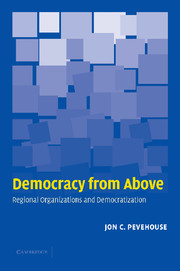Book contents
- Frontmatter
- Contents
- List of figures and tables
- Acknowledgments
- Abbreviations
- 1 Democratization and international relations
- 2 Regional organizations, the transition to and the consolidation of democracy
- 3 The supply-side of democratization and initial tests
- 4 Regional organizations and the transition to democracy
- 5 Regional organizations and the transition to democracy: evidence from cases
- 6 Regional organizations and democratic consolidation
- 7 Regional organizations and the consolidation of democracy: evidence from cases
- 8 Conclusion
- References
- Index
8 - Conclusion
Published online by Cambridge University Press: 22 September 2009
- Frontmatter
- Contents
- List of figures and tables
- Acknowledgments
- Abbreviations
- 1 Democratization and international relations
- 2 Regional organizations, the transition to and the consolidation of democracy
- 3 The supply-side of democratization and initial tests
- 4 Regional organizations and the transition to democracy
- 5 Regional organizations and the transition to democracy: evidence from cases
- 6 Regional organizations and democratic consolidation
- 7 Regional organizations and the consolidation of democracy: evidence from cases
- 8 Conclusion
- References
- Index
Summary
Since 1974, democracy has become an increasingly ubiquitous form of government. In the words of one scholar, “Democracy seems to have scored an historic victory over alternative forms of government” (Held 1993: 13). What has accounted for the rise of democracy and its prospects for continuation has become the focus of a large scholarly community. Despite the widespread interest in these issues, how international factors shape these processes has not received “sufficient attention” from these scholars (Hall 1993: 279).
The purpose of this book has been to investigate one aspect of the international influence on democratization: the effect of regional organizations. Through theorizing about causal processes, as well as testing the link between regional IOs and democracy, I attempted to bring a systematic approach to the investigation of external–internal linkages. Such an effort is essential not only for political science theory and research, but policymakers as well.
The argument
In Chapter 2, I presented several causal processes linking membership in and the joining of regional organizations to both democratic transitions and democratic endurance. The successes of regional institutions arise from their ability to create both positive and negative incentives for domestic actors. A regional organization's ability to either promote or protect democracy grows out of its capacity to influence the cost–benefit calculations as well as the perceptions of societal actors, often at the behest of these same domestic actors.
With regard to democratic transitions, regional organizations can provide a low-cost forum for neighboring democracies to pressure non-democracies to liberalize.
- Type
- Chapter
- Information
- Democracy from AboveRegional Organizations and Democratization, pp. 199 - 218Publisher: Cambridge University PressPrint publication year: 2005



